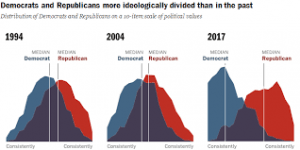by Scott F. Aikin and Robert B. Talisse

Popular political commentary from across the spectrum is replete with warnings social about “bubbles,” “silos,” and “echo chambers.” These are said to produce “closure,” “groupthink,” and an “alternate reality.” In turn, these forces result in the dysfunction of polarization, a condition where political officials and ordinary citizens are so deeply divided that there is no basis for compromise or even productive communication among them.
That polarization is politically dysfunctional might seem obvious. Where polarization prevails, the ground for compromise recedes, and so politics becomes a series of standoffs and bottlenecks. Yet politics still needs to get done. Hence democracy devolves into a numbers game of modus vivendi truces and strained compromises, resembling nothing like self-government among social equals.
In order to know what to do about polarization, we need a more precise view of what it is. It is helpful to distinguish (as we have elsewhere) between two different kinds of polarization: political polarization and belief polarization. The former refers to various ways of measuring the distance between political rivals. This distance can be conceived in terms of policy and platform divides or else in terms of inter-party antipathy. But in either case, where political polarization prevails, the common ground among politically opposed parties falls out, resulting in political deadlock. The latter, belief polarization, refers to a phenomenon to which we are all subject by which interactions with like-minded others transforms us into more extreme versions of ourselves.
When we talk only to others who share our views, we each come to hold more extreme versions of those views. To be sure, the mechanisms that drive belief polarization are complex and cannot be explored here. Still, getting clear on the problem that polarization poses for democratic politics requires us to understand the way in which political polarization and belief polarization are linked. (We’ve explored a version of this question at Philosophy15 recently, too.)
Begin by noticing that political polarization is not a new phenomenon. Political intransigence, deadlock, and resentment are familiar features of the political order. And, arguably, certain forms of inter-partisan conflict are democratically healthy. Observe also that belief polarization need not be obviously politically problematic. The phenomenon entails that we are less in control of our beliefs and related attitudes than we would like. This might be bad news for us as cognitive creatures, but it is not clearly troubling for us in our roles as citizens. After all, moving towards more extreme versions of our political beliefs might in the end place us closer to the truth. So maybe, at least from this perspective, polarization is not really a problem after all?
Yes and no. One feature of belief polarization that is not frequently commented on is that as we become more extreme versions of ourselves, our beliefs about those with whom we disagree also shift. Again, repeated interactions with our fellow partisans transforms us into more extreme advocates of our partisan views, but it in addition makes nonpartisans look more alien to us. As we belief-polarize, we begin to regard those with whom we disagree as increasingly inscrutable, irrational, ignorant, and unreliable. We also lose the capacity to recognize nuance in their views; that is, belief polarization leads us to regard our opponents’ views as monolithic, brute, and extreme. We moreover come to regard larger and larger portions of their behavior as explicable by their political commitments; in other words, as belief polarization takes effect, we come to see more and more of what our opponents do – their shopping habits, what they eat, their profession, where they live, how they spend their weekends – as expressing their misguided political beliefs.
This other-regarding dimension of the belief polarization phenomenon provides the connection between belief and political polarization. As belief polarization leads us to regard our political rivals as increasingly benighted, irrational, and unreasonable, we become more and more inclined to distrust, dislike, and resent those who we regard as our opponents. We thus isolate ourselves increasingly among our political allies, and this in turn contributes further to belief polarization. Our political alliances thereby become more tightly knit and exclusionary; and consequently political parties and their leaders are incentivized to punctuate (and overstate) their policy and platform differences. All of this occurs within a self-perpetuating, spiraling dynamic that intensifies civic divisions and inter-partisan animosity. That is, belief polarization sets in motion a broader dynamic that not only codifies political polarization, but also erodes our capacity for proper democracy.
In our October column, we claimed that civic enmity is the product of this erosion. Civic enmity is the condition that prevails when democratic citizens lose the capacity to regard those with whom they disagree as entitled to an equal share of political power. We can now say that the dynamic that is initiated by belief polarization generates civic enmity. But notice that our vulnerability to belief polarization is enhanced by our attempts to engage earnestly and vigilantly in democratic action. Hence the problem of polarization: our fervor for democratic politics bears seeds of democracy’s undoing.
